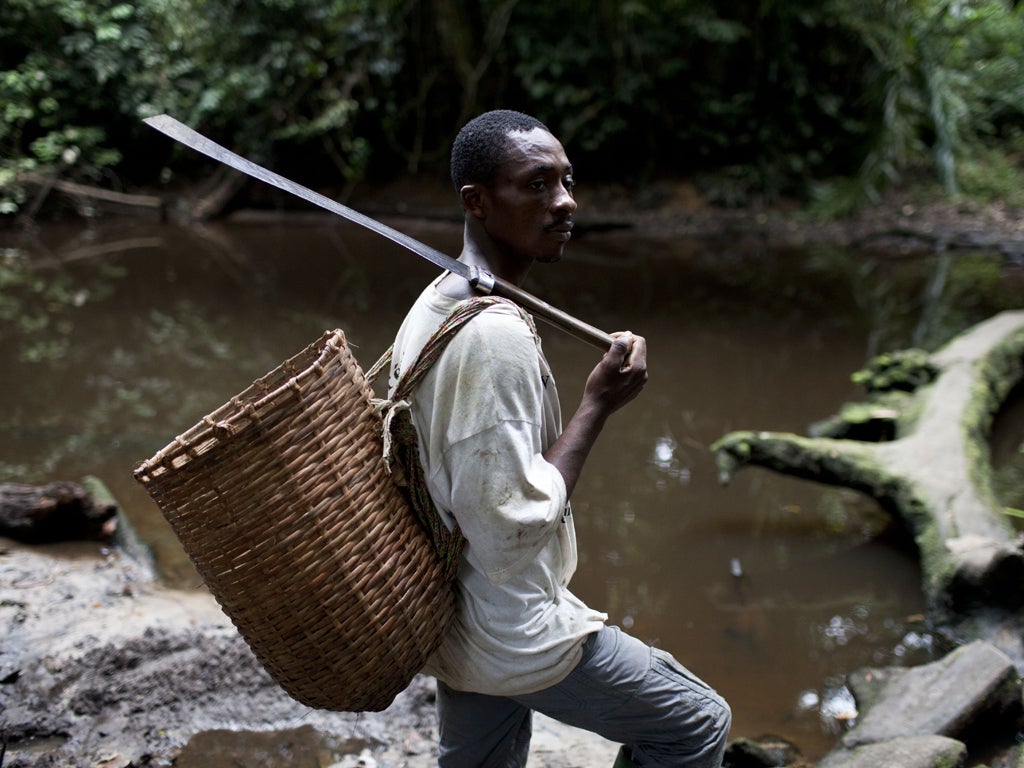
Deep in the rainforest of south-east Cameroon, the voices of the men rang out. "Where are the white people?" they shouted. The men, who begin to surround us, are poachers, who make their money from the illegal slaughter of gorillas and chimpanzees. They are not keen for their activities to be reported; the trade they ply could not only wipe out critically endangered species but, scientists are now warning, could also create the next pandemic of a deadly virus in humans.
Eighty per cent of the meat eaten in Cameroon is killed in the wild and is known as "bushmeat". The nation's favoured dishes are gorilla, chimpanzee or monkey, because of their succulent, tender flesh. According to one estimate, up to 3,000 gorillas are slaughtered in southern Cameroon every year to supply an illicit but pervasive commercial demand for ape meat.
One poacher in the southern Dja Wildlife reserve said he is involved in the trade because he can charge around £60 per adult gorilla killed. "I have to make a living," he said. "Women come from the market and order a gorilla or a chimp and I go and kill them."
Cameroon's south-eastern rainforests are also home to the Baka – traditional forest hunters who have the legal right to hunt wild animals, with the exception of great apes.
Felix Biango, a Baka elder, said the group used to hunt gorilla every few weeks to feed his village, Ayene, but has stopped since Cameroon outlawed the practice 10 years ago. However, he says that every week, three or four people come from the cities to ask the group to help them to hunt wild animals, such as gorillas and chimpanzees. While the Baka no longer hunt primates for themselves, Mr Biango says that they still kill gorillas for the commercial trade and will eat the meat if they find the animals already dead. Though Cameroonians have eaten primate meat for years, recent health scares have begun to raise fears about the safety of the meat.
Three-quarters of all new human viruses are known to come from animals and some scientists believe humans are particularly susceptible to those carried by apes. HIV is now widely believed to have originated in chimps.
Apes are known to host other potentially deadly viruses, such as ebola, anthrax, yellow fever and other potential viruses yet to be discovered.
Viruses are often transferred from ape to human through a bite, scratch or the blood of a dead ape getting into an open wound. There is a lower risk from eating cooked or smoked primates, but it is not completely safe.
Bushmeat is not only a concern for Cameroonians. Each year, an estimated 11,000 tons of bushmeat is illegally smuggled in to the UK, mainly from West Africa and is known to include some ape meat.
At the Ape Action Africa sanctuary, Rachel Hogan, who came to Cameroon from Birmingham 11 years ago, and her team, focus on the last of Cameroon's great apes. Most of the gorillas and chimps Ms Hogan and her team look after are babies who have witnessed the murder of their parents. They can even die from the trauma.
The sanctuary says there is nowhere in the vast tropical rainforest of Cameroon that the apes can safely be returned to the wild. "If this continues there might not be any wild populations of gorillas left," says Ms Hogan.
Subscribe to Independent Premium to bookmark this article
Want to bookmark your favourite articles and stories to read or reference later? Start your Independent Premium subscription today.

Join our commenting forum
Join thought-provoking conversations, follow other Independent readers and see their replies